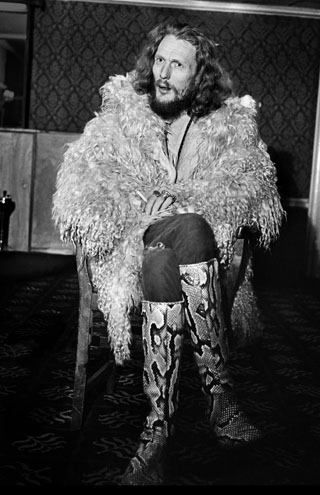“Step aside, Clapton, it’s time to give the drummer some,” begins Margaret Barton-Fumo, writing for Film Comment. “Jay Bulger’s debut, Beware of Mr. Baker, is a captivating documentary on Ginger Baker, known primarily as the drummer and founding member of the late Sixties supergroup Cream. A power trio comprised of Baker, bassist Jack Bruce and guitar ‘god’ Eric Clapton, Cream burned through the U.K and the U.S. with their unique version of blues-based, psychedelic-tinged heavy rock before disbanding after only two years in 1968. Forty years later, Bulger sought out the reclusive Baker and found a violent old curmudgeon living in debt on a gated estate in South Africa, huffing through a morphine mask as he tries to figure out how to keep his 39 polo ponies and the 27-year old wife who he met on the internet.”
“Three out of four wives, all three grown children, former bandmates Eric Clapton, Steve Winwood, and lifelong musical partner/nemesis Jack Bruce all participate at length,” notes Andrew Hultkrans at Artforum, “most expressing qualified if not outright affection despite Baker’s ill treatment of them over the years. Less surprising is the series of champion drummers who line up to heap praise on the man who, according to some, invented the archetype of the rock drummer. Stewart Copeland (Police), Nick Mason (Pink Floyd), Carmine Appice (Vanilla Fudge), Chad Smith (Red Hot Chili Peppers), Lars Ulrich (Metallica), Simon Kirke (Free/Bad Company), Neal Peart (Rush), Charlie Watts (Rolling Stones), Mickey Hart (Grateful Dead), Bill Ward (Black Sabbath), and Max Weinberg (E Street Band) all pay their respects; some say that, as teenagers, they decided to become drummers after hearing/seeing Baker perform. Had they been alive and in possession of a quantum of humility, the Who’s Keith Moon and Led Zeppelin’s John Bonham likely would have acknowledged similar debts.”
“If you were young, musical and British in the 1960s, rock ‘n’ roll was an irresistible career path, and Mr. Baker certainly, at least for a while, lived out the rock star legend to its fullest,” writes A.O. Scott. “But he was by taste and temperament more of a jazzman, captivated at an early age by African polyrhythms and the expansive approach of American drummers like Max Roach and Elvin Jones…. An earlier videotaped interview shows him choking up with emotion when he speaks of Roach, Jones, Art Blakey and Phil Seamen, jazz idols who came to recognize him as a peer.” Also in the New York Times, Franz Lidz talks with Bulger, who himself has been “a Golden Gloves boxer, a fashion model, a demolition worker and, under the name Dr. Mindbender, a music video director. Along the way he’s learned to talk his way out of scrapes nearly as fast as he gets into them.”
Cole Hutchison in Cinespect: “Perhaps some of the finest moments throughout the film consist of raw footage of Ginger’s performances, whether he’s involved in a friendly competition with one of his jazz idols, nearly falling out of his drum seat during a particularly inebriated set with Cream or—in one of the film’s few depictions of the man as having something that might border on compassion and understanding for others—engaging in a spirited percussive duet with his neglected yet enthusiastic son. Bulger could have essentially just strung together such footage of Ginger behind his kit, documenting the man’s aging skillset (and gradual facial shift from wild-eyed redheaded maniac to grey-bearded curmudgeon perpetually hidden behind prescription sunglasses) as he progresses from jazz clubs to packed stadiums to recording studios in Africa to a virtually untouched kit in the modest guestroom of his eventual secluded home. Such a visual guide to one of percussion’s most talented and relatively obscure totems would have been entertaining enough, but certainly wouldn’t have scratched the crusty, soiled surface of what exactly makes Ginger Baker a man to be wary of.”
“Breaking away—from families, from countries, from bands—is Baker’s signature move, made viable by his unique, tempestuous talent,” writes Nick Pinkerton in the Voice. “When Bulger asks Baker if he regretted leaving people behind in his move to Nigeria in the 1970s, Baker responds, ‘What people I’d left behind?’ Yet that move allowed Baker to play with Fela Kuti and set up the first 16-track studio in Lagos—giving some credence to Cyril Connolly’s dictum that ‘There is no more somber enemy of good art than the pram in the hall.’ … In spite of Bulger’s errors of tone, the movie stands as an engaging tussle with the question of what is permissible with the excuse of art.”
“For a subject as alarmingly unsentimental as Baker,” writes Nick McCarthy in Slant, “Bulger is able to pay homage to a life full of middle fingers while still uncovering Baker’s wry, subtle thoughtfulness through an intimate tête-à-tête with the man himself… Having previously written an exhaustive profile on Baker for Rolling Stone in 2009, Bulger takes advantage of the cinematic medium to give us a richer sense of the man on screen. Through charcoal-shaded, animated illustrations and an impressive collection of archival footage, Bulger illuminates Baker’s anecdotes. Bulger, however, is unable to sustain these inventive techniques, and what begins as a fluid and inventive mixed-media storybook gives way to more conventional, talking-head biography.”
“You’ll love the idea that someone like this deserves a movie, but with the whole of heavy metal in his debt, the honor is merited and handled with honesty,” writes Joshua Rothkopf in Time Out New York.
Beware of Mr. Baker screens at New York’s Film Forum through December 11.
Updates, 12/2: J. Hoberman for Artinfo: “As demonstrated by footage of Baker in his frenzied ‘Disraeli Gears’ heyday—wasted, wide-eyed, gauntly demented, and crowned with an explosive orange frizz that signifies pure static electricity—he was something like the Paganini of percussion.”
“Bulger and editor Abhay Sofsky work wonders with the archival footage, giving Beware Of Mr. Baker its own jazzy rhythm, but they can’t do as much with the interviews,” writes Noel Murray at the AV Club. “Bulger has the wizened, reflective likes of Clapton and Jack Bruce to play analyst. Baker is all about moving forward, enjoying the flow, and demanding that others keep up. Or as Baker himself snaps at Bulger, ‘Go on with the interview. Stop trying to be an intellectual dickhead.'”
Interviews with Bulger: Brandon Harris (Filmmaker) and Hillary Weston (BlackBook).
For news and tips throughout the day every day, follow @KeyframeDaily on Twitter and/or the RSS feed. Get Keyframe Daily in your inbox by signing in at fandor.com/daily.





